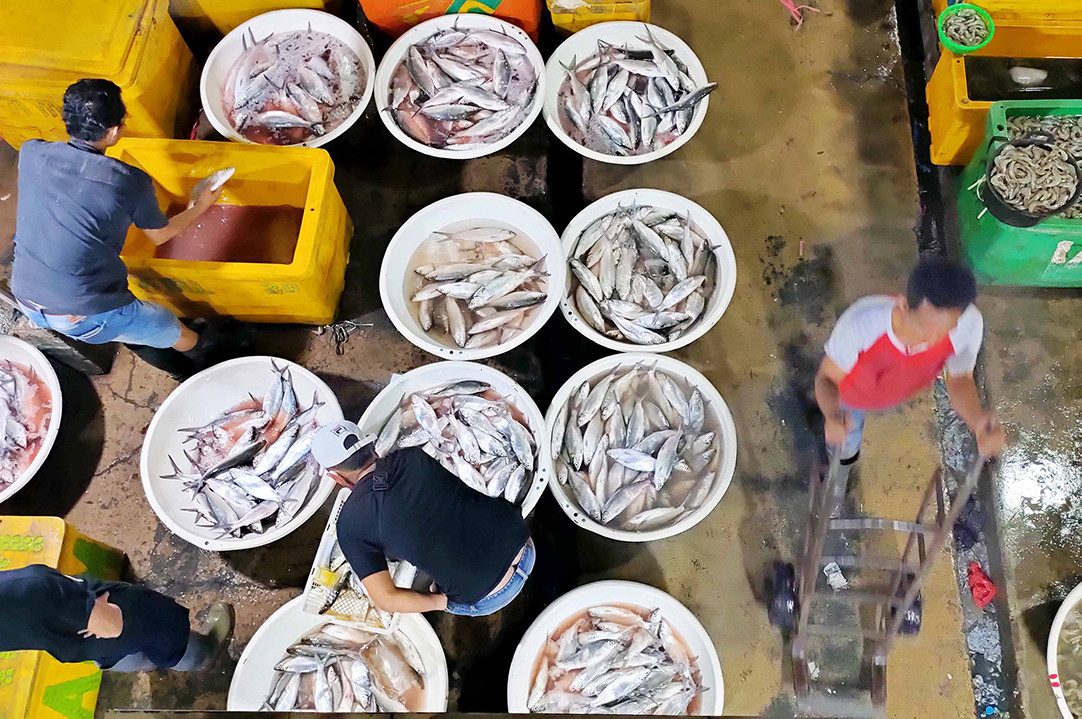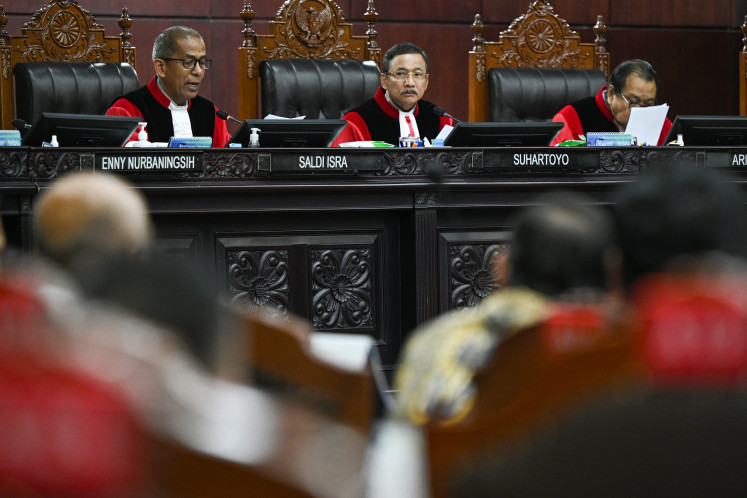Popular Reads
Top Results
Can't find what you're looking for?
View all search resultsPopular Reads
Top Results
Can't find what you're looking for?
View all search resultsJobs law regulations aim to boost small businesses
30 percent of commercial areas allocated for MSMEs
Change text size
Gift Premium Articles
to Anyone
T
he government’s newly issued regulations derived from the Job Creation Law are expected to improve the business climate for pandemic-wracked micro, small and medium enterprises (MSMEs) by easing licensing processes and facilitating demand.
For example, under Government Regulation No. 7/2021, the government and regional administrations are obligated to allocate 40 percent of their goods- and services-procurement budget for small businesses.
Meanwhile, ministries and state-owned, regional-owned and private enterprises, should also allocate 30 percent of their commercial areas, shopping centers and public infrastructure, such as airports and rest areas, for promotional and business development spaces for small businesses, the regulation stipulates. The rent for such space is capped at 30 percent of the commercial rental price.
MSMEs should also be able to obtain a business registration number (NIB) within three hours via the online single submission (OSS) platform, depending on the risk level of their business, according to Investment Coordinating Board (BKPM) head Bahlil Lahadalia. The NIB will also make it easier for the MSMEs to secure financing from banks, he said.
“For those with low risk [businesses], the NIB will be sufficient,” Bahlil said in a virtual briefing on Wednesday. “The BKPM’s focus on improving the competitiveness of MSMEs is offering [easier] business licensing and incentives.”
Bahlil also said the government aimed to facilitate small businesses in obtaining environmental permits if their business had a medium or high risk in regard to health, safety and the environment.
The jobs law has revised 79 prevailing laws in order to improve the country’s ease of doing business and to attract investment.
Read also: Ministry prepares regulation on small businesses to implement jobs law
The regulation overhaul comes as small businesses, which contribute around 60 percent to the country’s gross domestic product (GDP) and employ the majority of the workforce, have been hit by the COVID-19 pandemic. Most of them operate in the informal sector.
A survey by the Asian Development Bank (ADB) in 2020 showed that 48.6 percent of Indonesia’s small businesses had to suspend their operations a month after the virus outbreak. Many of them faced falling revenue, had to furlough their workers or delayed their payment, while also struggling to secure funds to stay in business.
Meanwhile, the recently issued Presidential Regulation No. 10/2021 on investment, also a derivative of the jobs law, stipulates that some sectors, such as salt extraction, are only available for investors under the condition that they partner with SMEs. Some sectors, including those not involving advanced technology, related to cultural heritage, and valued at less than Rp 10 billion (US$710,615), are also reserved for SMEs, including the soy-processing industry.
Through the regulation, the government also pledges to facilitate export standardization and certification for SMEs that have already secured a NIB.
The government is planning to launch the OSS platform on June 2 for a trial run and then officially in July.
Small and Medium Enterprises (SME) and Cooperatives Minister Teten Masduki said the allocation of space for cooperatives and small businesses in public infrastructure was expected to boost the competitiveness and sales of SMEs.
“For example, MSMEs getting into airports will go through curation so that they can compete with other products on display there,” he said, as quoted in a press release on Wednesday.
Indonesian MSME Association (Akumindo) chairman Ikhsan Ingratubun said he welcomed the regulations as small businesses would benefit from relaxed processes in obtaining licenses. However, the government’s allocation for small businesses in the public procurement of goods and services remains unclear.
Ikhsan said he was expecting the government to detail the goods or services allocated for MSMEs depending on the sector, such as chairs in the education sector, because it was expected to incentivize small businesses to make the products.
“We have yet to learn what they want to buy from MSMEs,” Ikhsan told The Jakarta Post in a phone interview. “If it is only cakes, gado-gado [vegetable salad], soto ayam [chicken soup] and office stationery, this has been around for a long time now.”
The government also needs to complement the requirement for big businesses to partner with smaller ones with capacity-building and mapping of small business potential in every region, according to Mohammad Faisal, the executive director of Center for Reform on Economics (CORE) Indonesia.
“Without any assistance, if it turns out the MSME products cannot meet the standards set by the big businesses, they will still be unable to partner,” Faisal told the Post in a phone interview on Wednesday.










